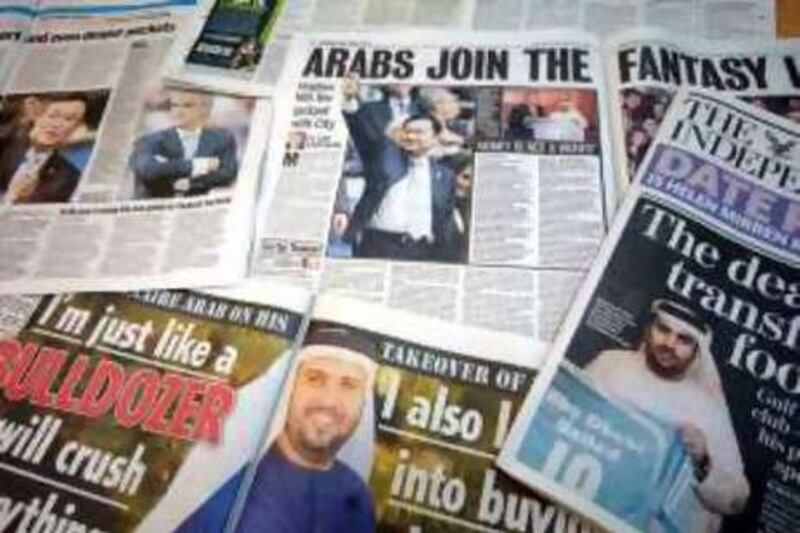The term "Al-bling" is a recent coinage, used last year by a journalist at The Times in London to describe a Middle East region he thinks is noted for its "style-over-substance properties". While at once fairly dismissive and nonsensical, the idea behind the term nevertheless concealed two points worth making: first, the Middle East is often noted for other, worse things; second, that foreign coverage of the Gulf in particular had become so boring that coining neologisms and spotting artificial trends had become necessary to inject some interest into the reporting. For a long time, it seemed that any article about the Gulf was obliged to mention both the "breakneck speed" of construction and, for good measure, to recycle the near-unprovable urban myth about the percentage of the world's cranes that were in Dubai. In practice, such clichés leave little room to convey any ideas about the region's inhabitants, who may wish to be known as something other than rapid builders. But it could be worse; the constraints that hectic lives and admittedly limited motivation place on the general foreign comprehension of the Middle East mean that this understanding depends greatly on the region's coverage in the world's newspapers. Given that the major stories of Iraq and Palestine routinely dominate the news from the region, conflict and unchanging politics are accordingly taken to be the most salient characteristics of the Arab world. However, the past few months, especially in Britain, have seen a significant increase in the media coverage of the UAE in particular, with the result that perceptions seem to be diversifying in a generally positive way. Between Manchester City and Michelle Palmer, a larger proportion of the British newspaper readership - whether of the news or the sport pages - has found something to identify with in the UAE. This is not to say understanding is complete, or free from inaccurate information or prejudice, but at least political troubles and rapid construction are facing competition as the perceived dominant characteristics of the region. At first glance, it was admittedly hard to see how the sorry tale of Michelle Palmer and Vince Acors, arrested in July and sentenced two weeks ago to three months in prison for indecency on a Dubai beach, might be a good-news story for the UAE, but that is how it has turned out. The behaviour of its citizens abroad has long been a pet subject in the UK media, where the term "Brits abroad" is frequently used to conjure up embarrassing images of drunken holidaymakers adding a little bit more shame to the national account. So it has been with this story, with some columnists even judging the three-month sentence to have been lenient. One such writer in The Daily Telegraph felt that "it is a lesson in the stupidity of offending against the customs of other countries when we visit them, something I wish we were hotter on here". In Britain, the maintenance of public order in the UAE is held to be an admirable example at a time when the state of public order in the UK is often characterised in tabloid reporting as "Broken Britain". This is not to say there is an ideological affinity per se between each nation's system of law; how crime and punishment abroad is viewed in the UK depends largely on the crime committed. Compare the Palmer-Acors affair with the recent high-profile case of Gillian Gibbons, a British teacher in Sudan jailed for eight days last November after being found guilty of insulting Islam, in which large sections of the media hardly saw a crime at all and therefore cried out against it. It seems the media failed to notice what was at best the irony, at worst the double standards, arising from the two cases. One writer on the Palmer-Acors case in the Daily Express asserted that "what we have no right to do is to try to lay down the law in a sovereign state in the Middle East". Large sections of the media, however, felt that this was precisely what the reaction to the Gibbons case should have been. What this represents is the identification of common ground between the two nations: discipline in public order is an ideal desirable to both populations and one which, parts of the media lament, seems to be far better realised in the UAE than in Britain. The second, much bigger, story was the takeover of Manchester City football club by the Abu Dhabi United Group for Development and Investment, the private-equity group led by Sheikh Mansour bin Zayed. This story was considered huge by most journalists, both for English football and Manchester City fans, and mention of Abu Dhabi in the British press increased thirty-fold in the week after the story broke. Recently, only the wars in Iraq and Afghanistan attracted such attention across the British media board. Four editorials were written in the broadsheets (The Independent alone devoted two editorials to the subject in the space of three days), with others appearing in the tabloids. Perhaps this proved the Orwell aphorism: "Serious sport is war minus the shooting." On hearing the news of the takeover, a writer in the Daily Mirror said English football had been buffeted as though by "a force 10 gale", while the Sunday Times reported that, for Manchester City fans, "the glee is unrestrained". In general, the takeover was positively received and seen as having the potential to enrich the national game in England. The move was not uniformly welcomed, with a number of dissenting voices concerned about "our national game" being sold overseas, but much of the opposition had nothing to do with Abu Dhabi itself. Rather, this story slotted neatly into a debate about foreign ownership in English football that had been under way for quite some time. The grumblers are resigned to this reality, while others are more optimistic. In fact, many were pleased that the power, players and influence that had been bought by previous injections of American and Russian money into the Premiership had been diluted by Abu Dhabi in one effortless move. Wealth - "unlimited sacks of dosh", according to The Times - was, unsurprisingly, a common feature of the reporting of this story. The Daily Mirror delighted in publishing, longhand, what it thought ADUG was worth: "£1,000,000,000,000." But behind the familiar stereotypes about wealthy Arabs, what emerges from a closer analysis of this aspect of the coverage was that Abu Dhabi is perceived to be projecting an identity distinct from that of Dubai. The capital emirate's efforts to establish a sophisticated world profile are not going unnoticed: a writer in the Sunday Times, citing the future arrival of outposts of the Louvre and Guggenheim, suggested that the emirate's rulers were "determined to establish Abu Dhabi's cultural credentials". While the distinction between the two emirates may be obvious to anyone in the UAE, Dubai has for many years been the place in the region that most people in Britain could identify with in some way. After all, after Florida, Dubai is reportedly the most frequently visited long-haul holiday destination for Britons, and the UK knows all about Dubai's endless sunshine, rapid construction and, now, the loose conduct of some elements of the British expat community there. Nevertheless, it is doubtful that many people in the UK could have named any of the other emirates - or perhaps even known that Dubai was an emirate - before the Manchester City takeover. But now, they can add something else to their Gulf geographical knowledge base: Abu Dhabi is a place with sound business acumen, a lot of money and a desire to spend it by developing its metropolis in a tasteful, cultural way. Greater coverage does not, of course, automatically mean greater understanding. The media are still prone to the same old stereotypes, lazy research practices and the constraints of time and resources. Wealth is still an ever-present factor in reporting the Gulf, with the usual generalisations about owning Bentleys and superyachts. Some might say that shared empathy about public order and a better geographical conception of the UAE do not really amount to much in the general scheme of things; besides which, these stories are arguably just extensions of previously held ideas about strict laws and Gulf wealth. But two points can be made in response. First, without any active effort, more common ground and individual detail is being grasped about an increasingly prominent nation in a region that is often known for much worse. Second, what makes these stories noteworthy is the connection between the role played by the UAE and the British readership - which, however you look at it, amounts to a healthy relationship. In both stories, the UAE is considered to have played a constructive role in its treatment of things British - be they citizens or football clubs. These gains are basically down to chance: Palmer and Acors got drunk, and the previous owner wanted to sell Manchester City; had these not been the case, things would still have been more or less as before. Yet engagement with the media is possible without leaving the generation of perceptions, positive or negative, to chance. Cross-cultural understanding, informed at least in part by the media, can benefit from active participation. Despite the feeling that the media are a faceless, uncaring machine, many would be surprised by the response that can be engendered by polite and factual correspondence. Letters do get read, apologies and corrections do get made and positive feedback is appreciated - and the chances of making a difference increase when acting in unison with others. Piers Morgan, the former editor of the Daily Mirror, wrote recently in his sport column in the Daily Mail about a dinner party he attended with Dr Suleiman al Fahim, the chief executive of Hydra Properties, who brokered the Manchester City takeover. It showed that it was possible for individual identities from the region to rise above regional generalisations in the media. Dr Fahim, wrote Mr Morgan, "was a very smart, very engaging and super-confident man who personified the dynamic business acumen pouring out of that part of the Middle East at the moment". It was a glowing reference that had nothing to do with spin, but everything to do with the man himself and, ultimately, a greater flow of information. As twofour54, the new Abu Dhabi media zone, gets under way, this type of connection can become only more frequent, enhancing coverage and understanding of the UAE and the region in general. It is worth noting that the term "Al-bling" has not caught on. * The National
Focus:A goal is achieved, home and away
Media coverage of the UAE and the Middle East in recent months has helped perceptions to diversifying in a generally positive way.

More from the national





